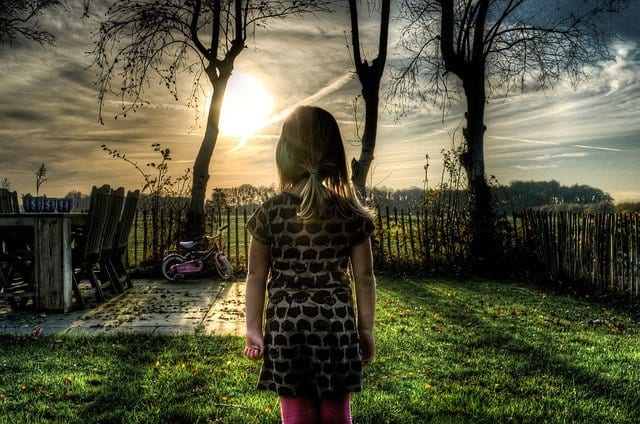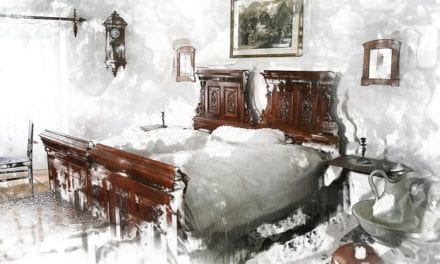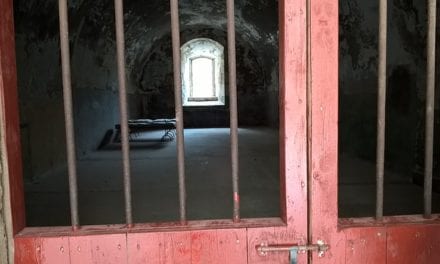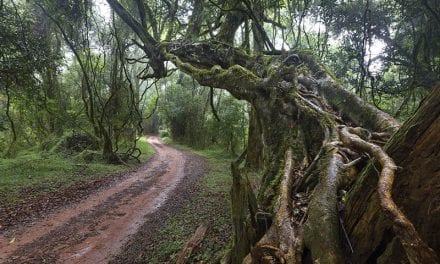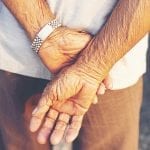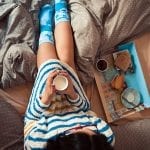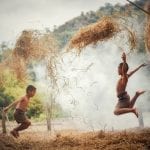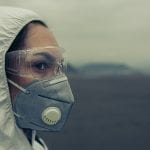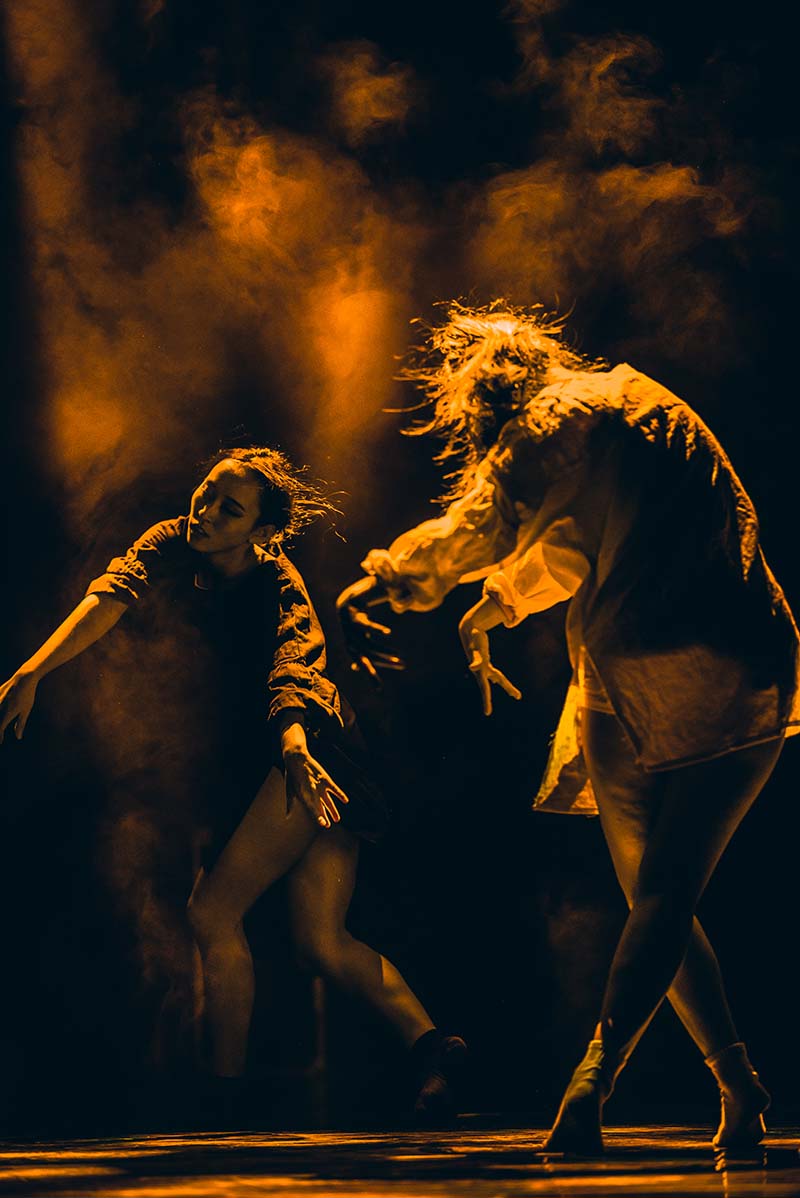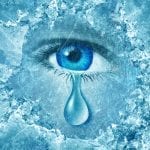The Little Girl Who is Really a Giraffe
When my little sister died for the first time—cause unknown—my mother invited my great aunt Freda to come and live with us. Her flight from Houston was delayed, so she just met us at the viewing, a simple affair attended by too many people, as most funerals for the very young are. My older brother was MIA, and both of my parents had gone frail: my mother from smiling and shaking hands, my father from uncontrollable weeping.
“Good,” my mother said when Aunt Freda materialized at the funeral home. Someone had laid out Elizabeth’s Brownies sash, decorated with bright merit badges, and a little Brownies beanie on a table. Inside her coffin, my sister’s hair was done in curls unlike she’d ever worn in life and for a minute, I forgot she was dead. I wished someone would curl my hair.
“Well,” Freda said. She shook herself as if she’d just come in from the rain. My great aunt Freda carried an expression of perpetual anticipation, as if she were always waiting for someone to pass her the ball. “I’m here.”
My mother nodded at her. “Thank you, Freda,” she said and hugged her. My mother, who had recently returned to work, had told me that she had always meant to get someone to come stay with us girls in the afternoon.
“There’s Peter,” I had reminded her. Peter was the oldest. We had been three: Peter, sixteen, Elizabeth, age nine, and me, ten.
“Oh,” my mother said. “Peter. Peter’s no good.”
But I knew what she meant. She did not mean Peter’s no good, like she hated him or regretted having him or anything like that. She meant Peter was no good as a piece of this puzzle she was trying to figure out. He was the wrong piece.
“Well, this is enough of that,” Freda said now. She took my hand, and together, we wove through the winding lines of people waiting to shake my mother’s hand. We had to find my father, who had, in his grief, disappeared. No-good Peter took our father’s place between the coffin and my mother. Freda and I searched the bathrooms, the offices, the hallways. She took me outside so we could peek through the windows of all the cars in the parking lot. We bent over them and shaded our eyes with our hands so we could see better. No, not there, we said again and again, until we were tired. Then, Freda set her suitcase beside our car so that my father could put it in the trunk once he reappeared. We started for home on foot. Freda led me on the graveled shoulder of the road and through the grassy ditches. The traffic beside us was like a single creature turning over and over in restless sleep, snoring angrily.
Magdaline! That was my sister calling to me on the day she died. She had been in her bedroom, and I was in mine. I sat at my small square desk, a gift from one of my father’s college friends—he’d made it himself—with a piece of paper, a hand-held pencil sharpener, and twenty-three coloring pencils. I was coloring a strand of DNA from my Your Human Body coloring book. The four nucleotides cartooned and magnified a hundred billion times. Thymine. Guanine. Adenine. Cytosine. It took more than one gene, my teacher had told me, to make my hair brown and my eyes equally brown.
I knew she was dead the second I saw her. She was slumped on the floor beside her unmade bed, wedged between the bed and the nightstand, and while I couldn’t guess what had killed her, it seemed that in her last seconds on this earth, she had tried to fit her physical body into the smallest space possible. Elizabeth had blonde hair so fair and so fine it was almost translucent, and blue eyes so clear and bright you couldn’t imagine they were real. I put my arms around her, squeezing myself into that same narrow place. She was so completely still, my own body seemed a raucous seesaw of pulse and breath.
Our mother’s whole world—her reason entire for existing—was wrapped around the three of us. “Your mommy will always take care of you,” she said. When she took her new job as the chief accountant at a modular home company, she bought each of us a new lunch box, including a shiny black faux crocodile one for herself. “I will never regret staying home with you all these years,” she told us, and she organized a counter full of apples—pink ladies, my favorite—in rows four deep, five across. Four of us, five days in the work week.
When she had been a little girl in Black Pond, Tennessee, she’d written essays about two things: being a mother and learning to ice skate. Both, she wrote, were within her grasp.
After we returned home from the funeral, Peter and I helped get Aunt Freda settled in Elizabeth’s room, and our parents positioned themselves opposite one another at the kitchen table. I could tell my mother wanted a drink, and finally she got up to fix herself one.
“I am the father of a dead child,” my father said.
“Horseshit,” my mother replied, plunking ice cubes into her glass. She covered her ice cubes with Southern Comfort.
My father made a noise like a bird chirp and then a low sort of hiccup, but very loud. He pressed his thumbs against his closed eyelids. My mother stood at the kitchen counter sipping her drink. I went to my father and tried to take his hands off his face. It was quiet then; Aunt Freda was already asleep in the other room. She’d traveled long that day, all the way from Houston, and then the long long walk home from the funeral home. I’d been to Aunt Freda’s house in Houston exactly once and I knew that the bedspread in her bedroom was medicinal pink. There were alligators in the lake behind her house. After a minute, the doorbell rang. It was the neighborhood bringing us dinner. No one knew what had become of Peter.
Elizabeth, Magdaline, Peter. Because our parents had, at one point, been religious. We had all been baptized as babies and you could find on the top shelf in each of our closets a long white candle inside a long, thin cardboard box. Our baptismal candles: they had each been lit exactly once.
We still went to church sometimes. And now, with our mother back at work, we were at it more than ever. We had switched, between our baby baptisms and the time for our confirmations, to Southern Baptist. My mother accepted the alter call every Sunday for a while. She made everyone coffee. She was going to sew the shepherd costumes for the living nativity, but we were late to church one Sunday. After that, we took the back pew.
We were that way for a few weeks. My father’s eyes were red, but he went to work like normal—he was a band teacher at the same high school Peter attended, although, of course, Peter was not in band—and my mother stood at the kitchen counter every day when she got home from work, her purse still on her shoulder, and dropped ice cubes into her glass. She said it was nice having Aunt Freda around, and I had to agree. She made the beds and cleaned everything and never tired of Uno. She had things to tell me, too. My Aunt Freda used to raise cockatiels at her house in Houston. Her first husband had died of a spider bite.
“Everything’s big,” she said, “in Texas.”
I liked to look at the things that appeared in our house now that she was here. She put a ceramic hula girl in a plastic grass skirt on my dresser to spiff the place up. There was a new set of avocado green salt and pepper shakers on the kitchen table. The clock in the kitchen had always been there, but I noticed it more now. I saw its hands move. It was raining outside, but warm. I liked the taste of Aunt Freda’s peppermints. They were as thin as buttons and they were blue. Comeback candy, she said. Retro. The sun came in through the blinds and made lines on the carpet. I missed my sister. I saw my mother’s collar bones now, and especially the spaces they created, smooth freckled hollows. Peter was an eating ghost; food disappeared. It was daddy’s busy season at the school. State competition, he said. He spoke with the tender sobriety of a little kid playing surgeon. Your brain had an attack. Your heart has hand and foot disease.
I told Aunt Freda Elizabeth was coming back to us, and her eyebrows shot up. Aunt Freda’s eyebrows were dark, thick, and untamed. My mother called them serious eyebrows, as in they were seriously big, seriously impossible to ignore. The hair on her head was wiry black and gray and her face was as cool and pale and slick-looking as Silly Putty. Now, she wrinkled her brow. She told me, “No, honey.” Elizabeth was not coming back. “Let’s make a caterpillar.” We made them out of egg cartons donated by the neighbors. Aunt Freda went out looking for donations while I was at school. Our house was littered with egg carton caterpillars and Wikki Stix DNA models. She told me Elizabeth was never, ever coming back.
But she was wrong, because Elizabeth was there now. She was standing behind my great Aunt Freda wearing a white nightgown, like a pre-teen girl’s version of a christening gown, and her hair was wet. She was now older than I was, but I knew it was her. I could smell her, even with her wet hair, even with her standing a few feet away. I hadn’t realized until that moment that this special Elizabeth smell existed.
“Elizabeth!”
But she brushed past me into the kitchen and opened the refrigerator. She stood there in the kitchen with the refrigerator door open, eating a cold hot dog. Aunt Freda got up to call my mother at work, and I stood next to my little sister. I lined my bare foot against hers on the tile floor to measure them.
I said, “How come you’re bigger?”
But she didn’t know. She just stood there, eating her second cold hotdog, until I put my arms around her middle, and because she was taller than me now, she inclined her head over me. Later, when it was time for bed, she held my head by the sides of my face and whisper-sang a song I used to sing to her.
In the morning, though, she was gone. Dead on her pillow. Her second funeral was that Thursday. This viewing and funeral was even better attended than the first one had been, but the guests were more nervous and fidgety than sad, and instead of cheese-bubbly casseroles and empty egg cartons, the neighbors brought food that had to be prepared: packages of spaghetti and bacon. Chef Boyardee Pizza Maker. A pound of rainforest coffee.
She was reborn the following week, appearing once again to Aunt Freda and me in the late afternoon. This time, she was as tall as our mother and skinny, with knobby elbows and knees and a very sharp jawline. The bones in her face and neck appeared hastily stacked, as if it was her thin pale skin that was holding them together. Her eyes were wide and afraid-looking, and so, even though she was taller and older than I’d ever seen her, she looked very young, too. Her hair was wet again but dried quickly, as if it were made out of the magic kind of sand, instant-drying. This time I ran away and hid from her. I lay under the bed with my eyes closed because I hated being there, the wood slates of the underside of the bed at the end of my nose. I heard her calling for me: Magdaline, Magdaline. I lay under the bed and pressed my thumbs into my eyelids until I saw the little explosions. Magdaline, Magdaline. I decided I would rather die than come out. After a while, she walked into the bedroom and sat on the bed, but was so light, the springs inside the mattress hardly complained. Then, my mother came in and sat down next to her, and my dad, carrying a platter of sandwiches, followed. Peter brought a roll of paper towels to use for napkins and Aunt Freda brought nothing but herself. She sat Indian-style on the carpet. People were talking about getting some root beer to go with the sandwiches, but nobody went. Eventually, I came out of my hiding spot, and my brother told us a story about one of his dreams.
“The people were animals trapped in human bodies. There was a chubby teenager who was really a hippopotamus. A little girl who was really a giraffe.”
My mother laughed. My dad listened carefully: how hard he was listening was written all over his face. Aunt Freda asked him if all the animals he dreamt of were from Africa. “Any cows,” she asked, “in your dream?”
“All of the creatures were horribly depressed,” Peter said. “Absolutely suicidal.”
The next time Elizabeth died, my mother said she’d had enough and that my father could plan this funeral. He brought his marching band to the church and had them usher the guests to their seats, wedding-style. He kept saying he was making lemonade here until my mother told him to cut it out. She pronounced the whole affair bullshit and went home to stand by the kitchen sink with her drink. Aunt Freda and I once again set out searching the backseats of cars, though we weren’t looking for my father this time. We were just looking.
When I was in the third grade and Elizabeth was in the second, our mother bought us extra math books for weekends and the summer and Christmas break. “You’re smart girls,” she said. “Practice.” She made Peter learn how to sew on the sewing machine. Our dad cooked dinners during this time, though he didn’t really want to. “Linda,” he said. “Come on.” He was sautéing mushrooms on the stove; we were having mushrooms with wild rice and a rotisserie chicken from the supermarket. My mother didn’t answer him. She was at the kitchen table, explaining scientific notation to Elizabeth. I was working out the lengths of the sides on a right triangle and scraping bits of nail polish off my toes with my other hand.
Elizabeth rose and went to the stove. She plucked a hot mushroom from the pan and swallowed it whole. She hit my father on the butt. On another day, she closed the math book on my mother’s finger and wouldn’t let go. “I don’t want to,” she said. Then, “Linda. Come on.”
I was always able to imagine my father at work because I’d been there. Even when we were little, we were allowed in the band room during the extra, afterschool practices that he held right before competitions. I could see my father nodding at the clarinets, beckoning the flutes with his finger. He held up one hand to silence the entire percussion section.
I could never do this with my mother’s job. She was an accountant, and I knew this meant she did something with numbers—money—on a computer, but I could only picture her at a desk in a blue-painted room with an oversized abacus, sliding the beads back and forth, frowning at them. She scratched her findings down on a pad of yellow paper. She sighed, exhausted. This was such hard work.
All the adults had their theories as to why Elizabeth kept dying and coming back. She was acting out, seeking attention. She had a tiny, fatal heart murmur, impossible to detect, let alone treat. She was addicted to pain killers. She had simply given up on life.
“But not all the way,” my brother pointed out. He was around more now, in the spring. It was as if the warm and wet weather had called him from his burrow. “She has given up on life but not all the way,” he said again, “obviously.”
My mother stared at him until he took it back. “Come on, Mom,” he said, “can’t you see we’re all trying?” He swept his hand out to indicate the rest of us: Aunt Freda and I coloring at the kitchen table, our father standing with his hand on the refrigerator door, contemplating dinner. What would everyone like?
I decided to simply ask Elizabeth why she kept dying. And, how was she able to return to us?
She looked at me with her translucent blue eyes and said she couldn’t help it. It was like breathing. In and out. Die, return, die, return. She said it had been fun the first time. She had just done it to see if she could. She said it was like going to a slumber party. You always come home from slumber parties. She said she would stop if I wanted her to. Did I want her to stop?
The next time, she didn’t die. Instead she packed a bag like normal people do when they’re leaving. She left a note, only two words: I’m sorry. Months later, we started getting her phone calls, updates. She had found a job in South Carolina; the name of the town was not disclosed to us. She was all right, living in Tennessee. Wasn’t our mother happy to hear that? That she was living in her mother’s home state? She’d seen a parade with an Oompa Loompa band. This was in a small town in Wisconsin who still tried to live like they were the Germans their ancestors had been. She was in Hawaii! (My mother said she knew she was lying.) She was in a place she couldn’t tell us about. She was okay, but tired. Very, very tired.
And then, we didn’t hear from her for a long time. Our mother was late to work ten days in a row and received a formal written warning. Our father’s marching band went on to nationals. Aunt Freda returned to Texas so she could watch the lake for alligators with my Great Uncle Tim.
On my very first day of middle school, I stood amid the between-class swirl of kids and backpacks and told myself to shut my hand in my locker. Just do it, I told myself again and again until the hallway had drained out of kids like water in the sink, and I was going to be late for class if I didn’t hurry.
What I remember about my sister: she used to suck her index finger instead of her thumb. When she was three, she dropped a jar of pickles on her big toe. She once tried to rescue tadpoles by scooping them out of the bird feeder where they swam about, so many tiny green-brown wriggling things. She held them in her hands until the water seeped through her fingers and then she shook the tadpoles free. I don’t know why she did that. She was old enough to know better.
She snuck food into her room. Bags of bread, peanut butter. She said was keeping it for “Just in case.” She never said in case of what.
She never sang in the shower, but she hummed everywhere she went. She didn’t know how to whistle.
She invented cake recipes. Then, because our mother didn’t like for us to use the oven when she wasn’t home, she wrapped the finished cakes and hid them in different places all over her room. After she was gone, we found them on the top shelf of her closet, in her sock drawer, under her bed. They were all hardened, drying to sugary dust. Her friends smoked clove cigarettes, but she didn’t. She wasn’t afraid of spiders, even though she knew about Aunt Freda’s first husband.
Now, sometimes, my mother tucks me into bed at night. Even though I’m practically in college. Aunt Freda has been home with her husband for years now, and Daddy is at a football game. Tonight, my mother lies down beside me and falls asleep before I do. I discover something new: she snores. But quietly. You wouldn’t know it unless you were very close to her, and awake. She sounds like a tiny old lawnmower trying very hard. I pretend she can do the sleeping for all of us. We all need our comfort. I imagine my father in the stands at the game feeling suddenly inexplicably rested. He has new energy; he feels like whistling. Peter, wherever he is, beats his chest like an ape in the Congo, invigorated. Even Aunt Freda’s alligators improve. Elizabeth will yawn the way you yawn when you’ve slept too much. I want to move into a more comfortable position, but it might wake my mother, so I hold myself still. I wait for everyone to feel better.

